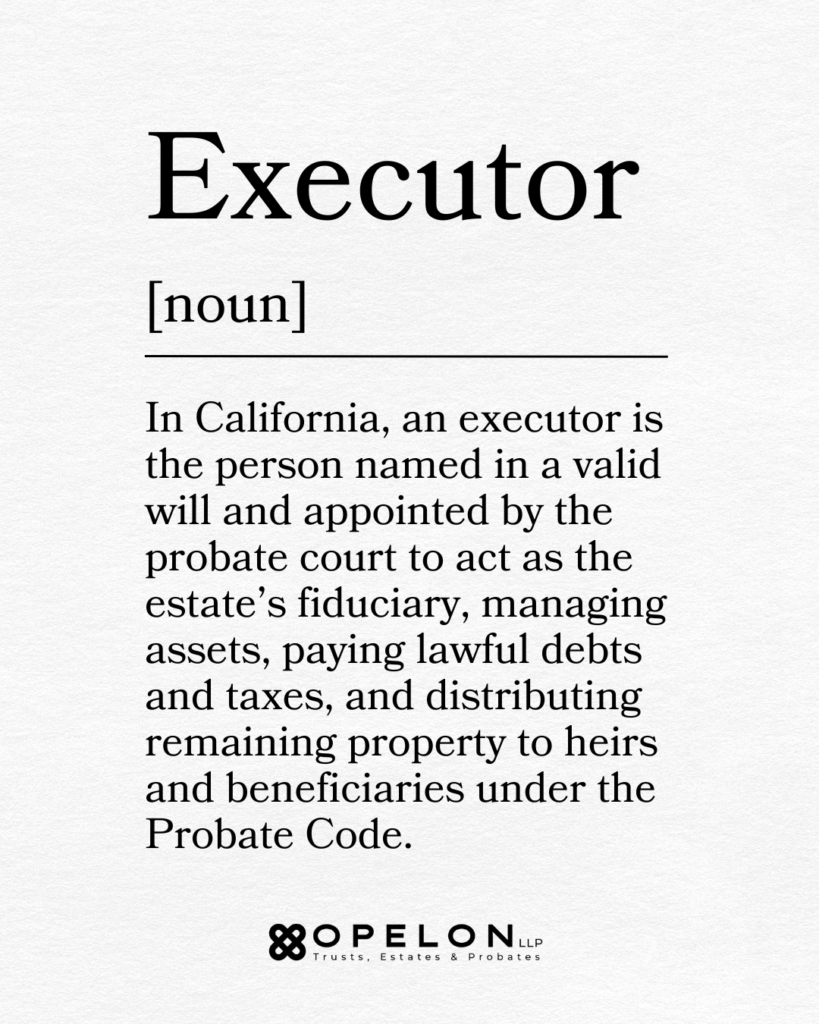Understanding the Role of Executor in California
When a loved one passes away in California, someone typically needs to manage their affairs. This person is often the executor named in a will or the administrator appointed by the court if there is no will.
For many families in San Diego, the term “executor” might be new, and the probate process can seem complicated.
This information aims to explain, in clear language, what an executor generally does in California, how probate usually proceeds in San Diego County, and important points to consider if you’ve been named an executor or are choosing one for your estate plan.
If you are facing executor responsibilities or planning for the future, understanding these roles can help you navigate California probate with more confidence.
Important Note:
This content provides general information about California probate law as of November 2025. It is not legal advice. Laws can change, and every situation is unique. You should consult with a qualified attorney for advice specific to your circumstances.
What Is an Executor in California?
An executor is the person named in a valid will to carry out the deceased’s wishes and manage their estate. If there is no will, the court usually appoints an administrator to perform very similar duties.
In simple terms, an executor gathers and protects the estate’s assets, handles debts and taxes, and distributes what’s left to the beneficiaries. This often happens under the court’s supervision if probate is required. Under the California Probate Code, an executor is considered a “personal representative” and a fiduciary. This means the law requires them to act with honesty, care, and loyalty toward the estate and its beneficiaries.

Who Can Be an Executor of a Will in California?
Executors are most often family members, such as a surviving spouse, an adult child, or a sibling. Some people choose a close friend or a professional who specializes in managing estates. For larger estates, a bank or trust company might serve as executor.
General Eligibility (Typical California Case)
In most California probate cases, the court will appoint the person named in the will if that person meets certain general requirements:
Factor | General Guideline in California |
|---|---|
Age | Must be an adult (18 years or older) |
Capacity | Not under a conservatorship; able to perform the required duties |
Character/Fitness | No serious dishonesty or misconduct that would prevent proper performance |
Residency | People living outside California can sometimes serve but might need to take additional steps |
If the person named as executor is unwilling, unable, or legally not qualified, the court usually looks to an alternate named in the will. If no alternate is named, the court follows the Probate Code’s rules to appoint an administrator.
Executor vs. Administrator in California Probate
California uses different titles depending on whether there is a valid will:
Term | When Used | Main Source of Authority |
|---|---|---|
Executor | There is a valid will that names a personal representative | The will and the California Probate Code |
Administrator | There is no will, or the named executor cannot serve | California intestacy laws (rules for dying without a will) and court orders |
Despite the different titles, executors and administrators generally:
- Ask the court to open probate when it’s needed.
- Obtain “Letters” from the court (Letters Testamentary for an executor or Letters of Administration for an administrator).
- Manage assets, debts, and taxes.
- Report to the court and beneficiaries.
- Distribute the estate when the administration is finished.
The name changes, but the main responsibilities are very similar.
Core Fiduciary Duties of a California Executor
Serving as an executor is a legal responsibility. In most California estates, the executor’s fiduciary duties include several key obligations:
Duty of Loyalty
The executor must always put the interests of the estate and its beneficiaries first, before their own interests. Actions like self-dealing (profiting personally from the estate), making secret profits, or having hidden conflicts of interest can lead to removal from the role or personal financial responsibility.
Duty of Care and Prudence
An executor must act with reasonable care. In practice, this usually means:
- Keeping estate money in a separate estate bank account (never mixing it with personal accounts).
- Making sure real estate and other property have enough insurance.
- Getting professional appraisals when needed to value assets.
- Consulting qualified legal or tax advisors for complex issues.
Duty of Impartiality
When there are several beneficiaries, the executor must treat them fairly and follow the instructions in the will or the rules for dying without a will. This applies even if the executor personally prefers one beneficiary over another.
Duty to Account and Disclose
The executor should keep clear records and provide required notices and financial reports to the court and, when appropriate, to beneficiaries. Being open and transparent is one of the best ways to prevent disagreements.
Typical Timeline: Executor Duties in a California Probate Case
Every estate is unique, but most California probate cases follow a similar order of steps. The outline below shows a common path for cases in San Diego County; the exact timing depends on the court’s schedule and how complex the estate is.
Phase 1: Immediately After Death
In many families, the person likely to be the executor will:
- Find the original will and any trust documents.
- Order several certified copies of the death certificate.
- Secure the home and other property (check locks, manage mail, ensure utilities are paid, confirm insurance).
- Make an initial list of major assets and debts.
These first steps focus on protecting and preserving property, not on legal filings.
Phase 2: Opening the Probate Case
If probate is necessary, the proposed executor typically works with a probate attorney to:
- File a petition to open probate in the correct county (in San Diego County, this is usually the San Diego County Superior Court, Probate Division).
- Submit the original will to the court.
- Send required written notice of the court hearing to heirs and beneficiaries.
- Attend a short court hearing if one is scheduled.
- Obtain “Letters Testamentary” (for an executor) or “Letters of Administration” (for an administrator).
These “Letters” are the official proof of your authority that you’ll need when dealing with banks, title companies, and others. In most California cases, the court issues these Letters after it confirms the will is valid (if there is one), the right person is being appointed, and all required notices have been given.
Phase 3: Inventory and Appraisal of Estate Assets
After the Letters are issued, the executor must identify, list, and determine the value of the probate assets.
Under California Probate Code section 8800, the Inventory and Appraisal is generally due within four months after the Letters are first issued. The court can grant more time if needed. A court-appointed Probate Referee typically values non-cash items such as real estate, investment accounts without recent statements, and business interests.
In most California estates, a practical inventory begins with a room-by-room list of personal belongings, collecting account statements, and identifying any San Diego real property or business interests that might need immediate attention or insurance updates.
Phase 4: Creditor Claims and Debts
California has specific rules for handling claims from creditors:
Rule | General Guideline in California |
|---|---|
Creditor claim deadline | The later of: (1) 4 months after Letters are first issued; or (2) 60 days after notice is mailed or delivered to that specific creditor (Probate Code § 9100) |
Overall outer time limit | In most cases, a lawsuit regarding a deceased person’s debt must be filed within 1 year of their death (Code Civ. Proc. § 366.2) |
During this phase, the executor typically:
- Sends required notices to creditors who are known or can be reasonably found.
- Reviews each claim to decide if it is valid.
- Pays approved claims from estate funds in the required order of priority.
- Rejects improper or late claims in writing, usually with the help of a probate attorney.
Phase 5: Taxes and Ongoing Management
Most executors must arrange for tax filings, which commonly include:
- The deceased person’s final federal and California income tax returns.
- Estate income tax returns if the estate earns significant income during its administration.
While taxes are being handled, the executor continues to manage estate assets, pay ongoing expenses (like insurance, utilities, and property care), and keep detailed records of all financial transactions.
Phase 6: Final Accounting, Distribution, and Closing
After debts, expenses, and taxes are settled, the executor typically prepares:
- A detailed financial report (accounting) showing all estate activity (or a simpler report if accountings are waived where allowed).
- A Petition for Final Distribution, asking the court to approve the accounting and allow distributions to beneficiaries.
- Documents for distribution and receipts for beneficiaries to sign.
Once the court approves the petition and orders distribution, the executor transfers assets, gets signed receipts, and asks for a final discharge, which officially closes the estate.
In many San Diego County cases, this process takes about 9 to 18 months. Estates with disagreements or complex issues can take longer.
Executor Task, Document, and Timeline Overview
To make the process clearer, the table below connects common executor tasks with the documents typically needed and the usual outcome or deadline in a California probate.
Executor Task | Required Documents / Forms | Typical Deadline / Outcome |
|---|---|---|
File probate petition | Original will, death certificate, petition to probate | Petition filed soon after death; Letters may follow in weeks to months |
Inventory and appraisal | Inventory form, appraisal reports, property valuations | Inventory filed within statutory deadline after Letters are issued |
Notice to creditors | Proof of publication and/or mailing receipts | Statutory claim period begins; creditors must file timely claims |
Final accounting and distribution | Account statement, receipts, releases from beneficiaries | Court approval allows estate closure and final distributions |
Managing Estate Assets: Practical Examples for California Executors
Good asset management often involves practical, detailed work. Common steps include:
- Protecting real property — consider changing locks, arranging for regular checks, and confirming adequate insurance (especially for vacant homes).
- Securing valuable items like jewelry, collectibles, and important documents in a safe place.
- Contacting banks, brokerage firms, and other institutions with copies of the Letters to confirm balances and stop unauthorized activity.
- Keeping a running list of discovered assets and updating it as new information becomes available.
Maintaining both a digital and physical inventory, with receipts and appraisal reports attached, helps support financial reports and protects against claims of mismanagement later.
Communicating with Beneficiaries: An Important Part of the Executor’s Role
In most California estates, one of the executor’s most important jobs is to keep beneficiaries reasonably informed. Clear communication can reduce misunderstandings and lower the chances of disputes.
Typical good practices include:
- Sharing key documents such as inventories, notices of court filings, and approved financial reports when required.
- Explaining the general timeline and next steps in the probate process in easy-to-understand language.
- Responding to reasonable questions about timing and plans for distribution.
- Keeping copies of emails, letters, and other communications in the estate file.
Executors do not have to provide every small detail in real time, but maintaining a regular flow of information and being responsive to concerns usually builds trust and helps the estate move toward its final distribution.
What an Executor Generally Cannot Do in California (Common Pitfalls)
Even executors with good intentions can make expensive mistakes. Common pitfalls to avoid, or to handle only after getting legal advice, include:
- Using estate assets for personal expenses without clear permission and documentation.
- Selling property to yourself, a spouse, or close family at a reduced price without full disclosure and court approval.
- Making large distributions to beneficiaries before confirming that all debts and taxes are paid or properly set aside.
- Failing to provide required notices to beneficiaries or creditors, which can cause delays or personal financial responsibility.
- Mixing personal funds with estate funds instead of using a separate estate account.
If you are unsure whether an action is allowed, it’s usually safer to ask the probate court for instructions or consult a San Diego probate attorney before moving forward.
The table below connects common actions that are generally not allowed with the legal principle behind the rule and how an executor should handle the issue correctly.
Action Generally Not Allowed | Reason Not Allowed / Principle | Consequence / How to Handle Correctly |
|---|---|---|
Self-dealing transactions (e.g., buying estate property for yourself) | Violates duty of loyalty and impartiality (putting estate interests first) | Transaction may be canceled; seek court approval or avoid entirely |
Early distribution before debts are paid | Interferes with creditor rights and payment priority | Executor may face personal financial responsibility; get court order before distributing |
Selling property without appraisal or court approval (when required) | Breaches duty of care and risks undervaluing assets | Obtain an independent appraisal; petition the court when appropriate |
Mixing personal and estate funds (commingling) | Makes accounting unclear and breaches fiduciary duty | Open a dedicated estate account, keep funds separate, fix any commingling with clear records |
How Executor Fees Work in California
California generally follows a set fee schedule for ordinary executor services. Under Probate Code section 10800, the typical fee structure for a personal representative is:
Portion of Gross Probate Estate | Statutory Executor Fee (Ordinary Services) |
|---|---|
First $100,000 | 4% |
Next $100,000 | 3% |
Next $800,000 | 2% |
Next $9,000,000 | 1% |
Next $15,000,000 | 0.5% |
Over $25,000,000 | A “reasonable” amount decided by the court |
A few points to keep in mind:
- The same statutory schedule generally applies separately to the estate’s attorney for ordinary services.
- Executors can ask for additional “extraordinary” compensation for work that takes an unusual amount of time (like managing a business, handling lawsuits, or complex tax issues), but the court must approve any extra amount.
- Family members sometimes choose not to take executor fees, especially when they are also beneficiaries, but they are not required to do so.
Beyond this set formula, some estates consider other ways to pay, such as agreed-upon flat fees or hourly rates for specific extraordinary services. Any nonstandard arrangement should be clearly documented and, in most cases where there might be disagreements or higher risks, submitted to the court for approval to avoid later disputes.
Because these fees are based on the total value of the estate (gross value), not just what’s left after debts (net equity), it’s wise to understand potential costs before starting probate.
How Executors Can Reduce Personal Liability in California
Serving as an executor always involves some level of risk, but you can manage much of that risk. Practical steps include:
- Following the Probate Code’s procedures and deadlines, especially for the Inventory and Appraisal and for creditor claims.
- Keeping estate funds in a clearly labeled estate account and never mixing them with personal funds.
- Documenting all decisions, payments, and communications with beneficiaries and creditors.
- Seeking court approval for major or disputed transactions instead of making assumptions.
- Working with a local probate attorney — especially in San Diego County — to avoid technical mistakes that can be difficult to correct.
For most families, getting professional advice early often costs less than resolving a later dispute or facing a surcharge (a court order to pay back money to the estate).
When Should an Executor Consider Hiring a San Diego Probate Attorney?
In some straightforward, smaller estates, an executor might be able to handle certain tasks alone. However, in most California estates, it typically makes sense to consult or hire a probate attorney when:
- The estate includes San Diego real estate, rental property, or a privately owned business.
- There are strained family relationships or a blended family dynamic.
- There are creditor issues, complex tax questions, or potential lawsuits.
- The executor lives out of state or has limited time to manage daily details.
Handling an estate without legal help increases the risk of missing deadlines, mishandling creditor claims, making incorrect tax filings, and unauthorized transactions that could lead to personal financial responsibility. A local San Diego probate attorney brings practical knowledge of regional court procedures and can help avoid expensive mistakes.
Frequently Asked Questions About Executors in California
How long does a typical California probate take?
Most routine California probate cases take about 9 to 18 months from the time of filing to closing. Busy court schedules, real estate sales, disagreements among beneficiaries, and tax issues can extend that timeline.
Can an executor be removed?
Yes. Interested parties — such as beneficiaries, co-executors, or others — can ask the court to remove an executor for good reason. Examples include failing to perform duties, mismanaging assets, self-dealing, or refusing to provide financial reports. The court reviews the evidence and decides whether removal is necessary to protect the estate.
What if the named executor does not want the job?
If the person named in the will does not wish to serve, they can decline, usually in writing. The court then looks to an alternate named in the will or to other eligible persons according to the Probate Code’s priority rules. It’s generally better to decline early than to accept the role and later abandon it.
What tax responsibilities does a California executor have?
Typically, the executor coordinates:
- The deceased person’s final federal and California income tax returns.
- Any estate income tax returns if the estate generates significant income during its administration.
For estates with substantial assets, retirement accounts, or business interests, it’s wise to involve a CPA (Certified Public Accountant) experienced in estate and trust taxation.
Do all California estates require probate?
No. Many estates avoid formal probate through tools like trusts, beneficiary designations, small-estate affidavits, or joint ownership. However, when significant real estate or other assets are solely in the deceased person’s name, formal probate in California is often required. A San Diego estate planning and probate attorney can review your situation and explain the options.
How a Firm Like Opelon LLP Helps Executors and California Families
Opelon LLP is an estate planning and probate law firm in Carlsbad serving families across San Diego County. They focus on helping parents, retirees, and blended families plan ahead and navigate probate when a loved one has passed. Learn more about their services.
In many probate and estate-planning matters, a firm like Opelon LLP can:
- Review your situation and explain whether full probate, a simplified procedure, or a trust-based approach makes sense.
- Guide executors and administrators step-by-step through the San Diego County probate process.
- Prepare and file the probate petition, Inventory and Appraisal, creditor notices, accountings, and final distribution paperwork.
- Coordinate with your CPA, financial advisor, and realtor to handle tax issues and real estate sales.
- Help design or update your estate plan so your chosen executor has a clear roadmap and fewer surprises.
If you’ve been named executor, are currently acting as a personal representative, or want to choose the right executor as part of your planning, you don’t have to do it alone.
Contact Opelon LLP at 760-278-1116 or schedule a consultation at their Carlsbad office to discuss your probate or estate-planning questions and take the next step with confidence.






